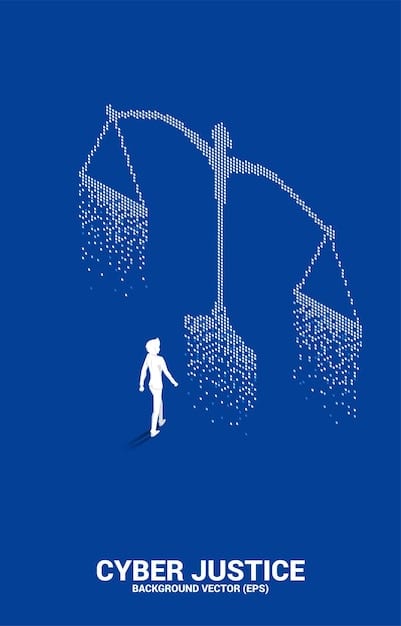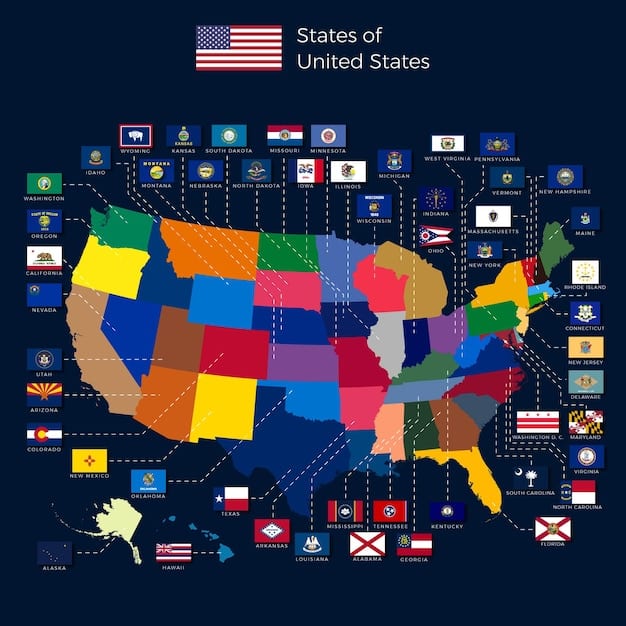US Blockchain Regulations: DeFi Impact in 2025

Updated US blockchain regulations are poised to significantly reshape decentralized finance (DeFi) protocols by 2025, influencing security measures, compliance standards, and the overall operational landscape for DeFi platforms within the United States.
The rapidly evolving landscape of decentralized finance (DeFi) is about to face a significant turning point. How Will the Updated US Blockchain Regulations Impact Decentralized Finance (DeFi) Protocols in 2025? This question is critical for understanding the future of DeFi in the United States, as new regulations are set to reshape its operational framework.
Understanding the Current US Regulatory Landscape for Blockchain
The current regulatory landscape for blockchain technology in the United States is complex and still developing. Various federal and state agencies are grappling with how to apply existing laws to this novel technology, leading to uncertainty and challenges for businesses operating in the blockchain space.
Several factors shape this landscape, including the lack of comprehensive federal legislation specifically addressing blockchain and cryptocurrencies. As a result, different agencies interpret existing regulations in varying ways, creating a patchwork of rules across the country.
Key Regulatory Bodies and Their Approaches
Several agencies play a crucial role in shaping the regulatory environment for blockchain in the US. These include:
- Securities and Exchange Commission (SEC): Focuses on whether digital assets are securities, applying securities laws to token sales and exchanges.
- Commodity Futures Trading Commission (CFTC): Regulates cryptocurrency derivatives and has asserted jurisdiction over certain virtual currencies as commodities.
- Internal Revenue Service (IRS): Provides guidance on the tax treatment of cryptocurrencies, classifying them as property.
- Financial Crimes Enforcement Network (FinCEN): Addresses anti-money laundering (AML) and counter-terrorist financing (CTF) concerns related to cryptocurrencies.
Each of these agencies has a unique perspective, leading to a fragmented regulatory approach.
State-Level Regulations and Initiatives
In addition to federal efforts, many states have introduced their own blockchain-related legislation. For instance:
- Some states have adopted laws defining digital assets and clarifying their legal status.
- Others have created regulatory sandboxes to encourage blockchain innovation while providing regulatory oversight.

This state-by-state approach adds complexity but also allows for tailored solutions that consider local economic and social factors.
Currently, the US regulatory landscape for blockchain is characterized by its complexity and fragmentation. While federal and state agencies are actively exploring regulatory frameworks, the lack of comprehensive legislation leaves considerable uncertainty for blockchain businesses. This necessitates a proactive approach to compliance and a keen awareness of the evolving regulatory environment.
Anticipated Changes in US Blockchain Regulations by 2025
Looking ahead to 2025, several anticipated changes in US blockchain regulations could significantly impact the DeFi sector. These changes are driven by the increasing adoption of blockchain technology, growing concerns about investor protection, and the need to address potential risks associated with cryptocurrencies.
As blockchain and DeFi continue to evolve, regulatory bodies are expected to refine their approaches to keep pace with technological advancements.
Potential Federal Legislation
There is growing momentum for federal legislation that provides clear guidance on the regulatory treatment of digital assets. Such legislation could:
- Define the legal status of various types of digital assets.
- Establish regulatory frameworks for cryptocurrency exchanges and other intermediaries.
- Address issues such as consumer protection, cybersecurity, and market manipulation.
Enacting comprehensive federal legislation will likely be a key priority, promoting greater certainty and consistency across the country.
Enhanced Focus on DeFi Compliance
Regulatory bodies are likely to increase their scrutiny of DeFi protocols to ensure compliance with existing laws and regulations. This could include:
- Applying securities laws to DeFi platforms that offer investment products or services.
- Enforcing anti-money laundering (AML) and know-your-customer (KYC) requirements for DeFi participants.
- Monitoring DeFi networks for illicit activities, such as fraud and market manipulation.
DeFi protocols will need to implement robust compliance measures to avoid regulatory enforcement actions.

Harmonization of State Regulations
Efforts to harmonize state-level blockchain regulations could reduce complexity and create a more business-friendly environment. This could involve:
- Adopting uniform laws that align with federal standards.
- Establishing interstate agreements to coordinate regulatory oversight.
Harmonizing regulations can foster greater innovation and investment in the blockchain space.
In conclusion, the US blockchain regulatory landscape is expected to undergo significant changes by 2025, driven by the need to address emerging risks and provide greater regulatory clarity. Potential federal legislation, enhanced DeFi compliance, and harmonization of state regulations could have far-reaching implications for the DeFi sector, requiring businesses to adapt proactively to the evolving regulatory environment.
Impact on DeFi Protocols: Security and Compliance
The updated US blockchain regulations will significantly impact the security and compliance aspects of DeFi protocols. These regulations are designed to protect investors, prevent illicit activities, and ensure the stability of the financial system.
DeFi protocols will need to enhance their security measures and compliance frameworks to meet these new requirements.
Strengthening Security Measures
Regulations may require DeFi protocols to implement stronger security measures to protect against hacks, fraud, and other vulnerabilities. This could include:
- Conducting regular security audits and penetration testing.
- Implementing multi-signature wallets for managing funds.
- Employing advanced encryption and access control mechanisms.
These measures can reduce the risk of financial losses and enhance investor confidence.
Enhancing Compliance Frameworks
DeFi protocols must develop robust compliance frameworks to adhere to regulatory requirements. This could involve:
- Implementing KYC and AML procedures to verify the identity of users and prevent money laundering.
- Monitoring transactions for suspicious activities and reporting them to regulatory authorities.
- Ensuring compliance with securities laws and other applicable regulations.
These compliance efforts can help DeFi protocols avoid regulatory penalties and maintain operational legitimacy.
Challenges and Opportunities
While regulatory compliance poses challenges, it also presents opportunities for DeFi protocols. By prioritizing security and compliance, DeFi platforms can:
- Attract institutional investors who are seeking regulated investment opportunities.
- Gain a competitive advantage over non-compliant platforms.
- Contribute to the long-term sustainability and credibility of the DeFi ecosystem.
The integration of security and compliance into DeFi protocols can foster a more secure, transparent, and sustainable financial system.
Updated US blockchain regulations will necessitate enhanced security measures and compliance frameworks for DeFi protocols. While this presents challenges, it also offers opportunities for DeFi platforms to attract institutional investors, gain a competitive edge, and bolster the credibility of the DeFi ecosystem. Prioritizing security and compliance is crucial for the long-term success and sustainability of DeFi in the United States.
Operational Adjustments for DeFi Platforms
In anticipation of the updated US blockchain regulations in 2025, DeFi platforms will likely need to make significant operational adjustments. These adjustments are essential for ensuring compliance, mitigating risks, and maintaining a competitive edge in the evolving regulatory environment.
These adjustments will affect various aspects of DeFi platform operations, from governance models to user onboarding processes.
Adapting Governance Models
DeFi platforms may need to adapt their governance models to incorporate regulatory considerations. This could include:
- Establishing clear decision-making processes for compliance-related matters.
- Creating mechanisms for stakeholders to provide input on regulatory issues.
- Ensuring transparency and accountability in governance structures.
Adapting governance models can enhance the legitimacy and sustainability of DeFi platforms.
Streamlining User Onboarding
Regulatory requirements, such as KYC and AML, may necessitate changes to user onboarding processes. DeFi platforms could:
- Implement automated identity verification systems.
- Collect more detailed information about users and their sources of funds.
- Provide clear disclosures about the risks and regulations associated with DeFi activities.
Streamlining user onboarding can improve compliance and reduce regulatory risk.
Risk Management Strategies
DeFi platforms should implement robust risk management strategies to address regulatory concerns. This could involve:
- Conducting regular risk assessments to identify and mitigate potential vulnerabilities.
- Establishing contingency plans for regulatory enforcement actions.
- Developing insurance mechanisms to protect users against financial losses.
By proactively managing risks, DeFi platforms can minimize the impact of regulatory changes and maintain stable operations.
DeFi platforms will need to make substantial operational adjustments to comply with updated US blockchain regulations. These adjustments span governance models, user onboarding processes, and risk management strategies. By adapting proactively, DeFi platforms can ensure compliance, mitigate risks, and sustain their competitive positions, ultimately contributing to a more dependable DeFi ecosystem.
The Role of Technology in Regulatory Compliance
Technology plays a pivotal role in enabling DeFi protocols to comply with updated US blockchain regulations. Innovative technologies can streamline compliance processes, enhance security, and provide greater transparency.
These technological solutions are essential for bridging the gap between regulatory requirements and the decentralized nature of DeFi.
RegTech Solutions for DeFi
RegTech (Regulatory Technology) solutions offer tools and services that automate and enhance regulatory compliance. For DeFi protocols, this could include:
- Automated KYC/AML systems that verify user identities and monitor transactions.
- Blockchain analytics tools that track illicit activities.
- Smart contracts that encode regulatory requirements.
These solutions can minimize the burden of compliance and reduce the risk of human error.
Blockchain Analytics
Blockchain analytics provides insights into transaction patterns, fund flows, and user behavior on blockchain networks. These tools can help DeFi platforms:
- Detect and prevent money laundering and terrorist financing.
- Identify market manipulation and fraudulent activities.
- Ensure transparency in DeFi transactions.
Blockchain analytics is crucial for maintaining the integrity of the DeFi ecosystem.
Privacy-Enhancing Technologies
Privacy-Enhancing Technologies (PETs) can help DeFi protocols comply with data protection and privacy regulations. These technologies include:
- Zero-knowledge proofs that enable users to verify information without revealing sensitive data.
- Secure multi-party computation that allows computations on encrypted data.
PETs can empower users to control their personal information and protect their privacy while complying with regulatory requirements.
Technology is instrumental in facilitating regulatory compliance for DeFi protocols. RegTech solutions, blockchain analytics, and privacy-enhancing technologies offer tools to streamline processes, enhance security, and ensure transparency. By embracing these technological advancements, DeFi platforms can integrate compliance into their operations, fostering a more secure, reliable, and sustainable financial system.
Future Trends and Predictions for DeFi in the US
Looking beyond 2025, several key trends and predictions are shaping the future of DeFi in the US. These trends include increased institutional adoption, regulatory innovation, and the convergence of DeFi with traditional finance.
These developments will influence the evolution of DeFi protocols and their integration into the broader financial ecosystem.
Institutional Adoption of DeFi
Institutional investors are showing increasing interest in DeFi, driven by the potential for higher yields, greater transparency, and innovative financial products. This could lead to:
- Increased capital flows into DeFi protocols.
- Development of DeFi solutions tailored for institutional investors.
- Adoption of DeFi by traditional financial institutions.
Institutional adoption will significantly impact the growth and maturity of the DeFi market.
Regulatory Innovation
Regulatory bodies are exploring innovative approaches to oversee the DeFi sector. This could include:
- Creating regulatory sandboxes to test new DeFi products and services.
- Developing tailored regulatory frameworks for different types of DeFi protocols.
- Collaborating with industry participants to promote responsible innovation.
Regulatory innovation can foster innovation while ensuring investor protection and market stability.
Convergence of DeFi and Traditional Finance
DeFi is increasingly converging with traditional finance (TradFi), as both sectors recognize the potential synergies. This could result in:
- Integration of DeFi protocols into traditional financial infrastructure.
- Development of hybrid financial products that combine DeFi and TradFi elements.
- Increased collaboration between DeFi and TradFi companies.
The convergence of DeFi and TradFi can broaden the reach of DeFi and drive innovation in the financial industry.
The future of DeFi in the US is bright, with key trends pointing towards increased institutional adoption, regulatory innovation, and the convergence of DeFi and traditional finance. These developments will shape the evolution of DeFi protocols, drive innovation, and promote greater integration into the broader financial ecosystem. By embracing these trends, the US can position themselves at the forefront of the global DeFi revolution.
| Key Point | Brief Description |
|---|---|
| 🛡️ Security Measures | Enhanced security protocols to protect against hacks and fraud. |
| 🏛️ Compliance Frameworks | Implementing KYC/AML to adhere to regulatory standards. |
| ⚙️ Operational Adjustments | Adapting governance and user onboarding for regulatory compliance. |
| 📈 Future Trends | Institutional adoption and convergence with traditional finance. |
Frequently Asked Questions
▼
Key bodies include the SEC, CFTC, IRS, and FinCEN, each focusing on different aspects like securities, commodities, taxation, and anti-money laundering, respectively.
▼
The SEC is expected to scrutinize DeFi platforms offering investment products, ensuring they comply with securities laws to protect investors.
▼
DeFi platforms are likely to implement KYC and AML procedures, monitor transactions, and ensure compliance with relevant securities and financial regulations.
▼
Enhancements include regular security audits, multi-signature wallets, advanced encryption, and robust access control mechanisms to mitigate risks of hacks and fraud.
▼
RegTech solutions, blockchain analytics, and privacy-enhancing technologies will automate compliance, provide transaction insights, and safeguard user data.
Conclusion
The updated US blockchain regulations expected by 2025 will significantly impact decentralized finance (DeFi) protocols. DeFi platforms will need to adapt, focusing on enhanced security measures, robust compliance frameworks, and proactive operational adjustments to thrive in the evolving regulatory landscape. By embracing these changes, DeFi can develop into a more secure, transparent, and sustainable component of the global financial system.





